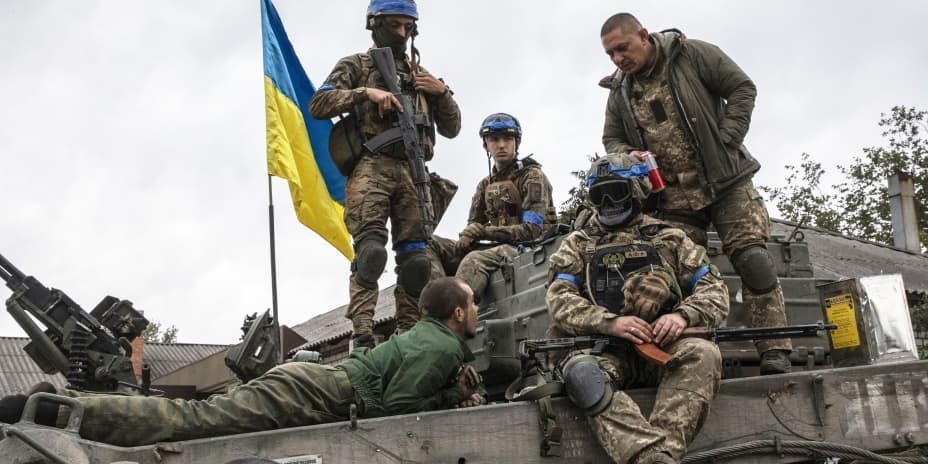Why We Are In Ukraine Part 3
Russia has invaded a much smaller neighbor without reasonable justification and waged unremitting war on it. It has flattened cities indiscriminately; murdered civilians with their hands tied behind their backs; systematically employed torture and rape; abducted thousands of children from occupied territories and sent them to Russia; brazenly killed dozens of #POWs and threatened to pseudo-judicially execute dozens more; utilized banned weapons including thermobaric bombs, cluster munitions, and anti-personnel mines disguised as children’s toys; undertaken a deliberate campaign to cripple Ukraine’s food supply and threatened to starve tens of millions of people in the Third World who rely on Ukrainian grain; vowed to eliminate all vestiges of Ukrainian culture and taken tangible steps to do so where its armies have advanced; forced millions to flee their homes, generating the largest refugee population in Europe since World War II; targeted schools, universities, maternity hospitals, theaters, museums, residential neighborhoods, and shopping malls, and threatened to unleash radiation on the world through its reckless actions near Ukraine’s nuclear power plants. To set the mood, in occupied Kherson, the Russians are putting statues of Lenin back up. When a Russian diplomat in Vienna, Mikhail Ulyanov, recently tweeted “No mercy to the Ukrainian population,” it was less a threat than an objective description of Russian strategy since February 24. Russia has, in short, waged a war of barbarism, a war one might expect from Genghis Khan, a KGB colonel, or a psychotic spurned lover. To actively oppose this behavior is hardly to dabble in utopianism. It is to recognize that if it is successful and hence normalized, there will be hell to pay for the United States, and the world.
Who would have counted it a failure for Ukraine to still be standing today, having stabilized the line, driven the Russian army back from Kyiv, neutered the Black Sea Fleet, and even struck deep into Crimea?
Some on the right suggest that all of this is mitigated, or perhaps even justified, by Putin’s supposed “traditionalism,” which turns out upon examination to be not much more than official opposition to homosexuality. By that standard, we should also have embraced Castro’s Cuba, the U.S.S.R., National Socialist Germany, and the Iranian Mullahs. The fact that the infantile left would orient our entire foreign policy around the question of the rainbow flag is not a reason that anyone else should.
On the other side of the equation is Ukraine, imperfect but worthy of defense against this onslaught. Whatever its faults, it is not in the same category as Iraq or Afghanistan, countries that the U.S. rather extravagantly hoped to drag into the democratic world. Ukraine is not being dragged into the democratic world against its will, its inclinations, or its capacity. It has chosen the West. It has chosen democracy, pluralism, civil society, and religious liberty. It is still undergoing political and social chemotherapy to cure 70 years of Soviet rule, but it wants to be cured, and has already done much to cure itself. Ukrainians have gone into the streets twice to free themselves from Russian domination, to cast their lot with the West, and to give themselves a chance for liberty. For six months now, they have stood up with courage and skill against amoral ferocity married to superior numbers. Their president, offered a flight out when Kyiv was imperiled, retorted, “I need ammunition, not a ride.” The contrast with Afghanistan’s president, who took the ride, could not be greater.
The voices that complain that America is willing to fight to the last Ukrainian have not been paying attention to the Ukrainians. They are the ones facing an existential threat to their country, and they are asking for the means to fight. An entire generation of Ukrainians has grown to adulthood in a free and independent Ukraine, and they have no intention of falling under the Russian boot. They will fight to the end if they have the means. If they find themselves without the means due to our rationalizations, they will fight to the end with IEDs, hunting rifles, bricks, and Molotov cocktails. The end will be uglier. The corpses will be theirs; the shame will be ours.
As Vladimir Putin seeks to correct “the greatest geopolitical tragedy of the 20th century” by bludgeoning his neighbor into submission, our strategic and moral imperatives coincide. Indeed, they are intertwined. To stand aside from the Russian invasion of Ukraine would be a betrayal of our interests, our principles, our friends, and our national honor, and could well turn into the greatest geopolitical tragedy of the 21st century, with far-reaching impact around the world. The question is not whether to help Ukraine, but how.
What Next?
It is here that the conservative critics make a trenchant observation. Their most solid argument against U.S. policy is that the Biden Administration and U.S. allies seem to have been pursuing a proxy war without a clear understanding of how the means, whether military aid or economic sanctions, are connected to the ends. There are risks, not least that the sanctions will backfire and corrode the role of the dollar as the reserve currency of the world. And they are right that American support for Ukraine has hardly been coherent and systematic.
This brief glimpse of realism is squandered, though, by the dreamy conclusion that “Ukraine’s war with Russia is at a decisive point. It is time to end it.” Unfortunately, it is Russia’s war with Ukraine, not the other way around. Russia initiated the war in 2014, expanded it in 2022, and shows no interest in ending it on just terms today. Moreover, Ukrainian policymakers are beholden to their voters, and their voters are in no mood to accept unjust terms. Very quickly the critics’ prescription boils down to either unalloyed wishful thinking or the unspoken proposition that the United States must force its friends to surrender to its enemies by cutting them off at the knees in the middle of a war of aggression waged against them.
Perhaps negotiations will ultimately be the way out, but it is unrealistic to think that Russia will agree to stop its war unless and until it is seriously set back on its heels. Can Russia, with its advantages in resources and population, be set back on its heels by an adequately armed and highly motivated opponent? The Japanese and the Finns did exactly that in 1904-05 and the “Winter War” of 1939. Now Ukraine has gone on the offensive, and has done so with enough vigor and enough success to turn the tide in its favor, at least for the moment. It is too early to know if the Ukrainians’ recent offensives can be sustained and expanded, but that, when properly equipped and trained, they are capable of extensive offensive operations can no longer be doubted.
This analysis would argue for expanding Western military aid to supply more and better weapons, including weapons denied to the Ukrainians so far. The Soviets, after all, supplied North Vietnam with modern tanks, MiGs, and state-of-the-art surface-to-air missiles without triggering World War III.
Would this mean reinforcing failure, as some have suggested? It has been six months since Russia launched its full-scale invasion. It has not been bankrupted nor has its army collapsed in disgrace. But who, on February 24, would have counted it a failure for Ukraine to still be standing today, having held the line, driven the Russian army back from Kyiv, neutered the Black Sea Fleet, retaken wide swaths of territory, and even struck deep into Crimea? What realistic person would have counted the sanctions a failure if their effect was to reduce Russia to firing anti-aircraft rockets at cities? Almost no one. It is not failure that we need to reinforce. It is incomplete success.





